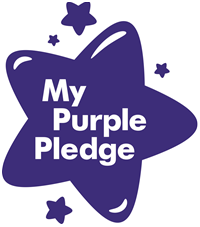Did you know that 112,000 young people in the UK are living with epilepsy? Young epilepsy released a flagship campaign called “My Purple Pledge” this month, to help make a difference. “My Purple Pledge” day was 26 March 2012, and it was to build up for the international day to mark epilepsy awareness and National Epilepsy Awareness Week in May 2012.
Young epilepsy would like all of us to do something purple to help raise awareness of the condition.
Your something purple pledge could be:
- Painting your toenails purple
- Wearing a purple shirt or blouse.
- Selling purple cakes.
- Making purple toffee.
Anything purple can be count, no matter how small.
My Purple Pledge aims to raise money for the UK’s only dedicated charity for young people with epilepsy and other neurological conditions.
Lisa Farmer, Director of Fundraising at Young Epilepsy, commented: “My Purple Pledge is a fun way of generating awareness about a very serious condition. All monies raised through the campaign will be used to provide life-changing support through our special school, college, medical centre and residential homes. Ultimately, it will help young people with epilepsy across the country to fulfill their potential.”
Epilepsy is a serious debilitating disorder of the body’s nervous system causing symptoms such as paralysis, muscle weakness and seizures. It affects around one child in every primary school and five in every secondary school. Around 6,000 young people will experience communication, learning or behaviour problems. In some cases they will also have a significantly higher mortality rate.
The Children’s ISA is the main My Purple Pledge sponsor for 2012, with the first commercial partner being EasyLink UK, which provides epilepsy seizure monitors.
Please visit www.mypurplepledge.com for more information or follow My Purple Pledge on Twitter @purplepledge. We may have missed the Purple Pledge official day for this year, but there will still be plenty of opportunities to get involved in fundraising for young people who need help.
Some Facts:
Around one in ten (6,000) experience severe communication, learning or behaviour problems due to their epilepsy.
- On average there is a child with epilepsy in every primary school and five in every secondary school.
- There are around 600,000 people in the UK diagnosed with epilepsy. That’s about one in every 131 people. There are around 50 million people with epilepsy in the world. Around 75 people are diagnosed with epilepsy every day.
About epilepsy:
- Epilepsy is a neurological condition – which means it affects the brain.
- Epilepsy is described as the tendency to have seizures. Epilepsy is only diagnosed after the person has had more than one seizure.
- Seizures are sometimes called ‘fits’ or ‘attacks’. Seizures happen when there is a sudden interruption in the way the brain normally works.



